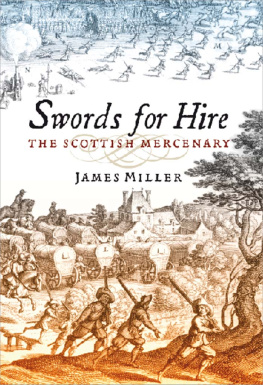
This eBook edition published in 2012 by
Birlinn Limited
West Newington House
Newington Road
Edinburgh
EH9 1QS
www.birlinn.co.uk
Copyright James Miller 2007
First published in 2007 by Birlinn Limited
The moral right of James Miller to be identified as the author of this work has been asserted by him in accordance with the Copyright, Designs and Patents Act 1988
All rights reserved. No part of this publication may be reproduced, stored or transmitted in any form without the express written permission of the publisher.
ISBN: 978-1-84158-446-1
eBook ISBN: 978-0-85790-548-2
British Library Cataloguing-in-Publication Data
A catalogue record for this book is available from the British Library

List of illustrations
The endpaper map and Figs 7, 8, 10, 11, 15, 17, 18, 19, 20, 21, 23 and 24 are taken from the multi-volume Theatrum Europaeum, a history of European affairs, by Johann Philip Abelin and others, published first in Frankfurt-am-Main in 1638 and on various dates thereafter. The artwork in the early volumes is by Matthaeus Merian (15931650).

Preface
I was in my teens when I first read in James Calders history of Caithness about a party of Scots mercenaries who were massacred in the Norwegian mountains in 1612 while on their way to fight for the king of Sweden. The story had the dimensions of a legend and intrigued me, but it was not until a few years ago that I had the opportunity to put some flesh on the bones of Calders account. I found that the massacre had really happened, although the assiduous Victorian historian had some of the details wrong. However, what was more surprising, it had been only one incident in a much longer, more complex story. My curiosity drove me on and the resulting search has been akin to exploring a weirdly designed mansion in which each door pushed open leads to other doors or sometimes to a dead end. In short, I came upon a phenomenon that was a common fact of Scottish life in the sixteenth and seventeenth centuries. Thousands of Scots went to Europe as soldiers and, looking at the records for the two centuries, it seems that at one time or another some served in the forces of almost every continental power and marched under every banner. Yet there was little in the popular arena about this, certainly nothing to compare with the library that has been written on the exploits of Scots in the British Empire. In histories of Scotland the mercenary soldier seldom rates a mention, let alone a footnote. Before new worlds lured us further afield, Europe was the ground on which we sought to fulfil our aspirations, and this we have largely forgotten.
It was not always so. The eccentric and prolix laird from Cromarty, Sir Thomas Urquhart, who died in 1660, wrote in inimitable style about the exploits of his fellow countrymen in Europe in a long panegyric called The Jewel. A few writers in the Victorian and Edwardian years brought out books for a wider public. One of the first was the prolific novelist and historian James Grant, who wrote Memoirs and Adventures of Sir John Hepburn (1851) and The Scottish Soldiers of Fortune: Their Adventures and Achievements in the Armies of Europe (1890). John Hill Burtons The Scot Abroad was published in 1864, and A. Francis Steuarts Scottish Influences in Russian History in 1913. The most important of this small group who surveyed Scottish activities in Europe was Th. A. Fischer, who produced three books of tremendous scope: The Scots in Germany (1902), The Scots in Eastern and Western Prussia (1903) and The Scots in Sweden (1907). All of these men wrote with pride of the Scots achievements. James Grant typically allowed his enthusiasm to carry him away. In every army in Europe, he states in his 1851 book, they have risen to eminence, and by their intrepid courage, persevering spirit, and inflexible integrity, though invidiously designated by some as adventurers, have attained the highest honours that can accrue to subjects. It wasnt quite like that for most of them, but Grant lived in an age that was both imperial and incurably patriotic. Academic historians have always been aware of the Scots involvement in Europe but the results of their research have usually remained within the covers of theses, journals and books aimed at a professional readership. The published work of several contemporary historians has been invaluable in the writing of this book, especially the volumes written or edited by Steve Murdoch, Alexia Grosjean, and David Worthington. Murdoch and Grosjean also edit a website dedicated to Scots who were active in northern Europe: www.st-andrews.ac.uk/history/ssne. Details of all the sources to which I have turned can be found in the notes and bibliography.
Within limits set by resources and time I have made an attempt to provide for the general reader a survey of the exploits and experiences of Scots who sought to earn a living as soldiers in Europe up until the late eighteenth century that is, until roughly the time they found service under a British flag in an expanding empire. The focus of the story is on Scottish involvement in the Thirty Years War (161848) but I have also attempted to provide some indication of the Scottish presence in Europe before and after that monumental conflict. Much more detail on certain individuals and incidents can be found in the sources listed but I hope the text here is sufficient to show the extent of our interactions with our immediate neighbours across the North Sea in centuries gone by. It has been necessary to provide historical background and context, and in the book the reader will come across passages trying to explain the complicated political troubles and manoeuvres of Europes ruling dynasties. For reasons of space I have had to simplify these accounts and, although professional historians may baulk at some of the liberties I have taken, I have tried to hold true to the main thrust of the historical record. In summary, I found that Scots have a habit of popping up as protagonists in the most unlikely corners of Europe, many as miserable foot soldiers far from home, but others as major players with the fates of nations in their hands. Information about them probably exists in almost every archive and museum where the documents on the history of the continent lie. There has not been time to follow every lead but I hope I have uncovered enough to show how closely involved with past politics and conflicts in Europe we have been. This book concentrates on military activity. It should not be forgotten that there were thousands of Scots directly involved in more peaceful pursuits as merchants, traders, teachers and clerics and their story also begs to be re-explored. Tucked away in archives from the Atlantic coast to the Urals are the details of the many parts we have played in the history of Europe, with their implication that we have yet much more to offer.

Acknowledgements
Many people have helped me during the research for this book. Here I can do no more than list their names and record my gratitude for their assistance, always cheerfully and generously given. In Belgium: the staff of the Bibliothque Royale de Belgique in Brussels.
Next page














